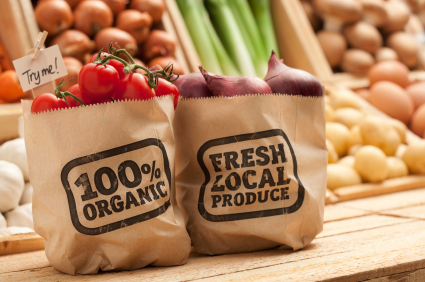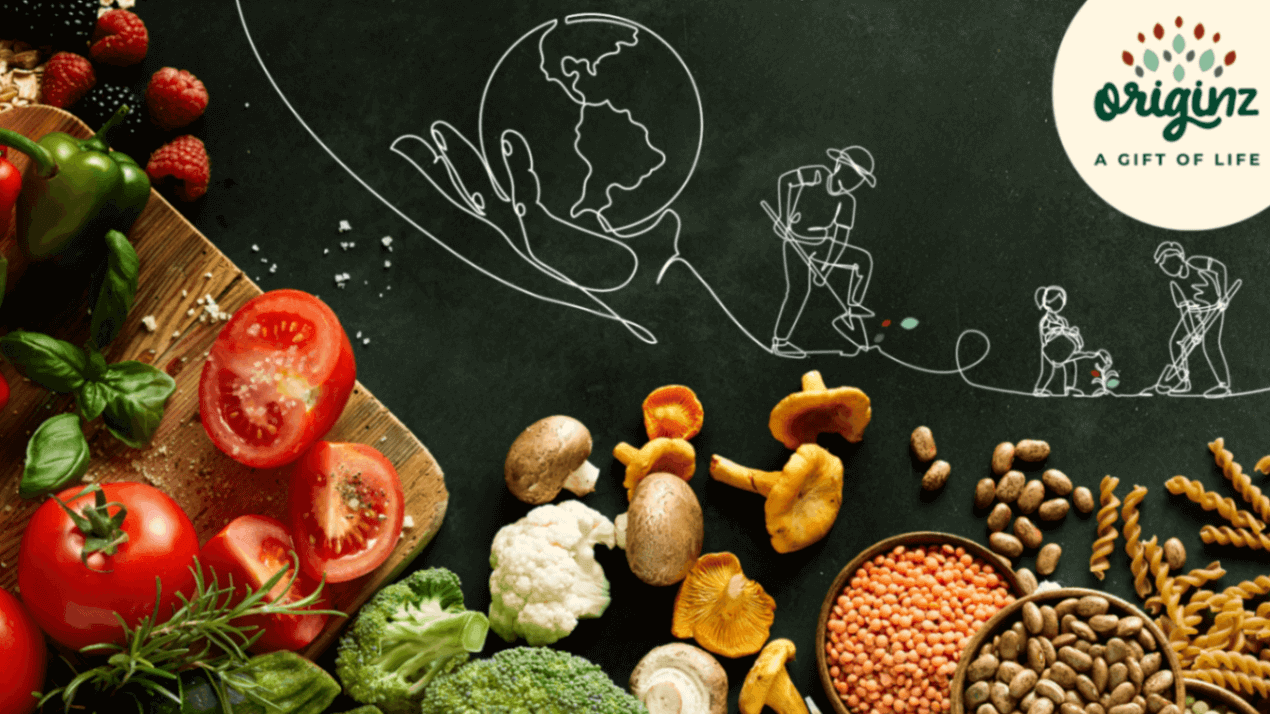Organic and Sustainable Food Products: A Path to Healthier Living
In today’s world, the importance of eating healthy and maintaining a balanced diet has never been more crucial. With the increasing awareness of environmental concerns and the need to reduce the ecological impact of our choices, organic and sustainable food products are taking center stage. These products not only support a healthier lifestyle but also contribute to a more sustainable and ethical global food system.
In this article, we’ll explore what organic and sustainable food means, their benefits for your health and the planet, and how you can incorporate them into your daily life.

What are Organic and Sustainable Food Products?
Organic Food
Organic food is grown without the use of synthetic fertilizers, pesticides, or genetically modified organisms (GMOs). Organic farming focuses on nurturing the soil and environment, using natural methods to combat pests, and promoting biodiversity. Certified organic products, such as fruits, vegetables, dairy, and meats, adhere to strict regulations set by governing bodies like the USDA Organic label in the United States or EU Organic certification in Europe.
The key characteristics of organic food include:
– No synthetic pesticides or fertilizers: Organic farmers use natural alternatives to promote soil health and pest control.
– Non-GMO: Organic food is free from genetically modified organisms.
– Animal welfare: Livestock raised organically must have access to pasture and cannot be treated with antibiotics or synthetic growth hormones.
Sustainable Food
Sustainable food goes beyond the organic label and refers to food products that are produced in ways that protect the environment, respect animal welfare, and contribute to the social and economic well-being of communities. Sustainable agriculture practices aim to ensure that food production can be maintained over the long term without depleting resources or causing harm to ecosystems.
Sustainable food includes:
– Ethical sourcing: Ensuring food is sourced from farms and producers that follow environmentally friendly practices, like reducing water usage and conserving soil health.
– Seasonal and local products: Supporting local farmers who use fewer resources and produce foods that are in season, which reduces the environmental cost of transportation.
– Minimal waste: Using sustainable packaging and reducing food waste by encouraging consumption of whole products and less processed foods.

Benefits of Organic and Sustainable Food Products
Choosing organic and sustainable food products offers numerous benefits for both personal health and the environment. Here are some of the most compelling reasons to make the switch:
1. Healthier Food Choices
- Free from harmful chemicals: Organic food is grown without synthetic pesticides, herbicides, or fertilizers, which means fewer chemicals end up on your plate.
- More nutrients: Studies have shown that organic produce can contain higher levels of vitamins, minerals, and antioxidants compared to conventionally grown foods.
- Better for your body: Organic farming practices promote healthier soil and food, which translates into fewer hormones, antibiotics, and preservatives in your food.
2. Environmental Impact
- Reduced carbon footprint: Sustainable food production tends to use fewer fossil fuels, reducing the carbon footprint of food production and transportation.
- Conservation of biodiversity: Organic and sustainable farming practices promote soil health and biodiversity, reducing the need for monoculture farming and creating healthier ecosystems.
- Water and soil conservation: Organic farming uses less water and focuses on soil health, ensuring that farming practices can continue without exhausting vital natural resources.
3. Supporting Local Communities
- Fair wages for farmers: Organic and sustainable food production often supports local farmers and ensures they are paid fairly for their labor.
- Community-driven agriculture: By supporting local and sustainable farmers, consumers contribute to building more resilient food systems that benefit local economies and communities.
4. Ethical Treatment of Animals
- Cruelty-free farming: Organic livestock farming ensures that animals are raised with access to pasture, and not confined in cramped spaces. They are also not treated with antibiotics or hormones.
- Healthier livestock: Sustainable farming focuses on animal welfare, ensuring that livestock is healthier and happier, which ultimately leads to higher-quality meat and dairy products.
How to Identify Organic and Sustainable Food Products
When shopping for organic and sustainable food products, it’s important to know how to differentiate them from conventional products. Here are some tips:
1. Look for Certifications
- USDA Organic: This is a reliable certification in the United States that ensures the product has been grown and processed according to strict organic standards.
- EU Organic: In Europe, this certification ensures that food products meet organic standards.
- Fair Trade Certified: Products with this certification are sourced in a way that promotes fair wages and safe working conditions for farmers and workers.
- Rainforest Alliance: This label indicates that the product is sustainably sourced, protecting ecosystems and supporting local communities.
2. Check Labels for Ingredients
- Avoid products with long lists of artificial ingredients, preservatives, and chemicals, as they often indicate that the product is not organic or sustainably produced.
- Choose foods that list simple, recognizable ingredients, which are more likely to be grown without harmful chemicals.
3. Buy Local and Seasonal
- Support local farmers and markets to ensure that the food you’re purchasing is fresh, in-season, and has a minimal environmental impact from transportation.

How to Incorporate Organic and Sustainable Food Into Your Diet
Making the switch to organic and sustainable food doesn’t have to be difficult or expensive. Here are some simple ways to get started:
1. Start Small
You don’t have to overhaul your entire diet overnight. Start by swapping a few conventional items for organic versions. Begin with the Dirty Dozen—a list of the 12 fruits and vegetables most likely to contain pesticides—and choose organic options for these foods.
2. Grow Your Own
If you have the space, growing your own fruits and vegetables is one of the best ways to ensure your food is both organic and sustainable. Even a small herb garden can reduce your reliance on store-bought products and minimize your environmental impact.
3. Buy in Bulk
Buying organic foods in bulk, such as grains, beans, and nuts, can reduce packaging waste and often save you money. Many stores offer organic bulk bins, so you can buy exactly what you need.
4. Support Local Farmers Markets
Farmers markets are great places to find fresh, local, and sustainably grown food. By purchasing directly from local farmers, you help support their sustainable practices and reduce the carbon footprint associated with food transportation.
FAQs About Organic and Sustainable Food
1. Is organic food better for the environment?
Yes, organic farming methods typically reduce environmental impact by avoiding synthetic pesticides and fertilizers, conserving water, and supporting biodiversity.
2. Is organic food more expensive than conventional food?
While organic food can be more expensive, the long-term benefits to health and the environment make it a worthwhile investment. Additionally, buying in-season and local can help reduce costs.
3. How can I make sustainable food choices on a budget?
You can buy organic products in bulk, prioritize seasonal fruits and vegetables, and shop at local farmers markets to find more affordable options. Additionally, growing your own food can significantly reduce costs.
4. Is it possible to eat a sustainable diet without going completely organic?
Yes! You can still make sustainable choices by opting for locally grown, seasonal, and minimally processed foods. The key is to focus on reducing your carbon footprint and supporting ethical, sustainable farming practices.
Conclusion
Choosing organic and sustainable food products is a powerful way to improve your health and the environment. By supporting organic farming and sustainable agriculture, you contribute to a more ethical food system that values both people and the planet. Whether you’re looking to reduce your environmental impact, improve your diet, or support local farmers, making informed choices in your food purchases can lead to a healthier and more sustainable future for all.
Start making a difference today by incorporating organic and sustainable foods into your diet. For more information on organic food certifications and sustainable agriculture practices, visit the USDA Organic website or explore the Sustainable Agriculture Research & Education Program.

